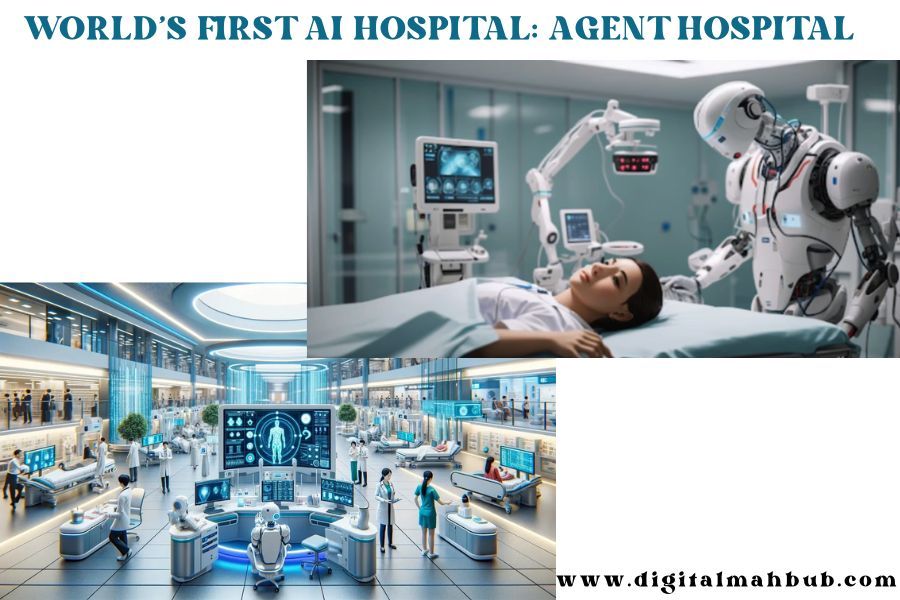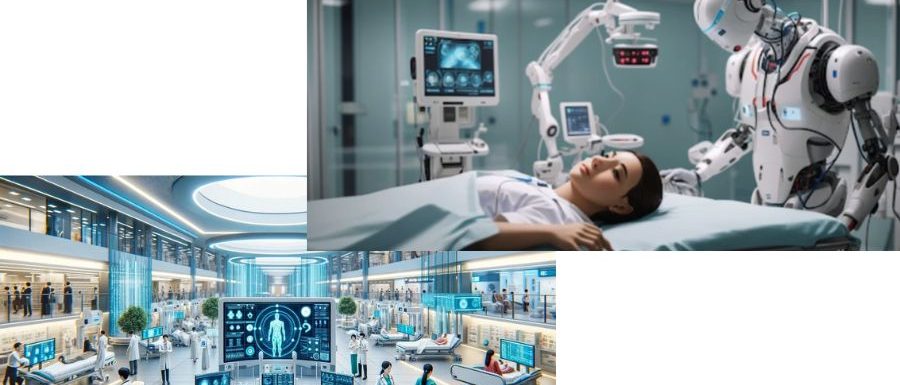In a groundbreaking advancement that could redefine global healthcare, China has unveiled the world’s first fully AI-powered hospital, aptly named Agent Hospital. This pioneering initiative, developed by researchers at Tsinghua University, places China at the forefront of medical innovation, blending artificial intelligence (AI), large language models (LLMs), and virtual simulation to revolutionize diagnosis, treatment, and medical education.
Table of Contents
What Is Agent Hospital?
Agent Hospital is a completely virtual medical facility—meaning it exists entirely in the digital world with no physical location, human staff, or traditional infrastructure. Instead, it is operated by a team of:
- 14 AI doctor agents
- 4 AI nursing agents
These AI-powered agents manage up to 3,000 virtual patient interactions per day, diagnosing conditions, recommending treatments, and managing patient records in real time. Unlike chatbots that offer canned responses, these AI agents function autonomously using sophisticated medical models, simulating clinical reasoning and even adapting their bedside manner based on patient type—whether pediatric, geriatric, or psychiatric.

How Does an AI Hospital Work?
At the core of Agent Hospital lies a powerful technology stack built on large language models (LLMs)—the same underlying technology that powers advanced AI systems like ChatGPT, but specifically trained on:
- Medical literature
- Clinical protocols
- Diagnostic frameworks
- Patient interaction patterns
This enables the AI agents to perform a wide range of medical tasks such as:
- Taking patient histories
- Reviewing lab and imaging results
- Diagnosing diseases from common infections to rare conditions
- Designing treatment plans
- Simulating patient follow-up
What makes these virtual doctors particularly impressive is their adaptive learning capacity. Through reinforcement learning and real-time performance feedback, they continuously refine their knowledge and accuracy. In fact, in controlled testing, the AI agents achieved a 93.06% score on the U.S. Medical Licensing Exam (USMLE)—a performance comparable to, and in some cases better than, top-tier human medical graduates.
Virtual Medicine at Scale: From Diagnosis to Simulation
Agent Hospital isn’t just a tech demo; it’s an operating facility where 10,000 virtual patients can be treated within a few days—a volume that would take human doctors approximately two years to manage.
The AI system can:
- Diagnose complex, multi-layered illnesses
- Manage long-term care simulations
- Adapt to patient feedback in real time
- Simulate the spread and containment of infectious diseases, offering powerful forecasting tools for public health officials
Such scalability presents unprecedented potential in regions suffering from physician shortages or lacking adequate healthcare infrastructure.
Robotic Surgery: Beyond Virtual Diagnostics
Though Agent Hospital is virtual, China is also making strides in AI-assisted physical procedures. At the EYE & ENT Hospital of Fudan University, surgeons recently conducted the world’s first remote, non-invasive AI-guided surgery using a transoral robotic system. This operation was performed from over 5,000 kilometers away, achieving:
- Sub-millimeter precision
- 30% reduction in surgery time
- Lower risk of complications
These robotic systems integrate AI to reduce human error, eliminate hand tremors, and provide visual enhancements that surpass human perception, ultimately offering safer and faster surgeries.
Medical Education Reinvented: AI as Professor
One of the most exciting aspects of Agent Hospital is its role in transforming medical education. Medical students can now train in a fully simulated environment using virtual patients. This offers several key benefits:
- Risk-free learning: No harm can come to real patients.
- Wide exposure: Students can encounter and practice treating rare diseases they might never see during clinical rotations.
- Real-time feedback: AI can track learning curves and provide instant guidance.
- Scalability: Students in remote or underfunded regions can access elite training using only a headset and internet connection.
This model addresses one of the biggest challenges in global medical education: the shortage of clinical training infrastructure and qualified mentors.
The Ethics and Challenges of AI Hospitals
Despite the enthusiasm, Agent Hospital raises important ethical and regulatory questions:
- Can machines provide compassionate care? While AI can simulate empathy, it lacks consciousness and emotional nuance.
- Who is responsible if an AI makes a mistake? Legal frameworks for AI accountability in healthcare are still in early stages.
- How do we prevent algorithmic bias? If training data contains racial, gender, or socio-economic bias, AI agents might inadvertently perpetuate discrimination.
- What about patient privacy? These systems rely on vast amounts of sensitive health data, requiring strong data protection laws and protocols.
Addressing these concerns will be crucial for widespread adoption.
Asia’s Growing Influence in Global MedTech
The launch of Agent Hospital underscores Asia’s rapid rise in AI and medical technology leadership. Events like MedTech World’s tours in Shanghai and Singapore, and its upcoming Hong Kong roadshow, further demonstrate the region’s commitment to cross-border collaboration in healthcare innovation.
China’s success in launching a fully AI-powered hospital parallels initiatives like Stanford’s AI Town, but on a much larger and more integrated scale. It sets a precedent not only for technological capabilities but also for how nations can approach scalable healthcare reform.
What’s Next?
China’s Agent Hospital marks a pivotal shift in how healthcare might be delivered, taught, and managed in the future. The immediate potential lies in hybrid models where:
- AI handles diagnostics, data review, and patient triage
- Human doctors focus on critical care, emotional support, and complex decision-making
This paradigm could relieve healthcare systems overwhelmed by demand, while ensuring quality care is accessible, efficient, and continuously improving.
As technology advances, the hospital of the future may no longer be a building with walls—but rather a network of intelligent, virtual systems powered by code, data, and compassion simulated through design.
FAQ: World’s First AI-Powered Hospital
Q1: What is Agent Hospital?
A: Agent Hospital is the world’s first fully AI-powered, virtual hospital developed by Tsinghua University in China. It is run entirely by artificial intelligence, with no human doctors or physical location.
Q2: Who developed Agent Hospital?
A: It was created by researchers at Tsinghua University’s Department of Computer Science and Technology.
Q3: How many AI agents does the hospital use?
A: The hospital uses 18 AI agents—14 doctors and 4 nurses.
Q4: Can this AI hospital treat real patients?
A: Currently, it treats virtual patients in simulations. However, it lays the groundwork for future real-world applications.
Q5: How accurate are the AI doctors?
A: They achieved a 93.06% score on the U.S. Medical Licensing Exam (USMLE), which is comparable to top-performing human medical students.
Q6: What is the purpose of this AI hospital?
A: It’s used for testing AI medical capabilities, simulating patient care, and training medical students.
Q7: Is Agent Hospital being used for real surgeries?
A: No, but China has used AI-assisted robots for real surgeries, including a landmark remote operation via a transoral robotic system.
Q8: Can this technology replace human doctors?
A: Not entirely. It’s designed to support and enhance human doctors, not replace them—especially in areas requiring empathy and complex judgment.
Q9: How does it help in medical education?
A: Medical students can train with AI patients in a safe, simulated environment, improving skills without needing live patient access.
Q10: What are the concerns with AI hospitals?
A: Key concerns include ethics, accountability, patient privacy, and the risk of biased decision-making.
Q11: Is this the only AI hospital in the world?
A: Yes, Agent Hospital is the first of its kind. However, similar AI-assisted systems are being developed worldwide.
Conclusion
The world’s first AI-powered hospital isn’t just a Chinese innovation—it’s a global wake-up call. It redefines what’s possible in healthcare and signals the dawn of a new era where machine intelligence complements human compassion. Whether you’re a medical professional, policymaker, or patient, the question is no longer if AI will change medicine—but how far we’ll let it go.

Leave a Reply